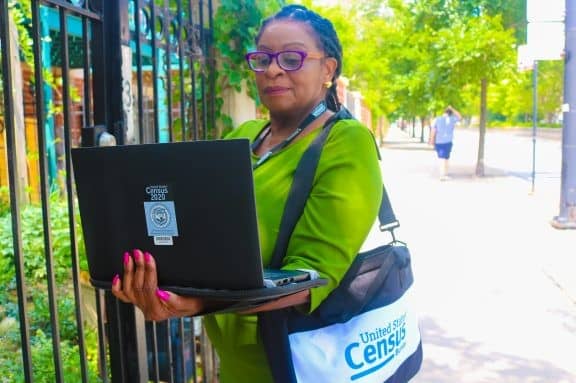
Thousands of high-paying jobs available in California and nationwide
by Mark Hedin, Ethnic Media Services
With Census Day – April 1 — fast approaching, the Census Bureau is ramping up its hiring. There are thousands of jobs to fill.
The national census, taken every 10 years since 1790, is the country’s biggest single peacetime project. The goal is to count each and every person living in the United States, no matter how young or old, no matter their citizenship, no matter anything. If they’re here, they count.
Knowing how many people live where will affect political representation and billions of dollars’ worth of spending decisions over the next decade. It’s so important that California has committed $180 million just to try to make sure everyone in the state responds to a census questionnaire, whether it’s done online, on paper, over the phone or in person. There’s that much at stake.
The federal government will spend billions to do that counting and hire about a half-million people to do the work. Plenty of jobs are still open. Pay varies depending on where you are, but in Northern California, hundreds of jobs are still open that pay from $24 to $33 per hour.
“We still urgently need people to apply for the jobs,” a San Francisco-based census recruiter told Ethnic Media Services. “We welcome all applicants.”
Just as the 2020 Census will be the first to rely on people going online to fill out their household questionnaires, would-be workers must use a computer to apply for census jobs. The website for applying is www.2020census.gov/jobs.
Nationwide this week, the Census Bureau is hosting thousands of events as it kicks its recruitment effort into high gear to help fill those jobs.
About a half-dozen different types of work need to be done. The biggest need: Workers to ring the doorbells or knock on the doors of people who didn’t fill out the census questionnaires online, on paper or by phone. These workers, known as “enumerators,” will have to instill enough trust to get an in-person response.
Every “Area Census Office” (there are 30 in California, from Bakersfield to West Covina) will need 600-800 enumerators. The pay scale can range up to $30 per hour in some areas, such as the Northern California counties of Santa Clara, San Mateo and San Francisco.
In San Diego County, the pay rate for enumerators is pegged at $20.50 per hour; in Del Norte and Fresno counties, it’s $16.50; in Kern County, $17. In Los Angeles, there are eight ACOs, seven of them are offering $21 per hour. At the eighth, it’s $18.
For every 20 enumerators, there has to be a supervisor. So every ACO needs between 30 and 40-some of those, depending on the size of the local population it’s trying to count. Supervisors make a few dollars more per hour, and recruiters too.
Then, every census office also needs dozens of office clerks, and for every 10 of those, a supervisor. In the San Francisco Bay Area, the pay rate for those positions runs to $24 and $31 per hour, respectively.
The Census Bureau has filled most of its office management positions, the Bay Area source said, and completed the address verification stage of the census process, finalizing the lists of addresses where it believes people live.
“The pay scale can range up to $30 per hour in some areas, such as the Northern California counties of Santa Clara, San Mateo and San Francisco.”
So, for now the main thrust is to attract job applicants for the actual enumeration process.
The census figures it may need up to eight applicants for every opening: An applicant may find that temporary work is not for them, or find other jobs while the census is reviewing their application, or simply change their mind about wanting the job.
The positions, though, are ideal for people seeking extra income because the hours are flexible and the schedule could allow the workers to hold another job or attend school.
Applicants must clear a background check, be citizens, 18 or older and have an email address. They’ll be fingerprinted, too.
Having a misdemeanor conviction isn’t necessarily a disqualifier, a census spokesperson told Ethnic Media Services.
Although census work is under way already, the jobs the Census Bureau is recruiting for now are expected to begin next year. Office staff will be employed in the run-up to the release of the census questionnaire, April 1 at the latest, earlier in some cases, whereas enumerators won’t be brought in until it’s clearer how much follow-up work needs to be done to collect data from those who didn’t respond to questionnaires.
The non-response follow-up work that comprises the bulk of the enumerators’ assignment is expected to run from May through the end of July.
In all cases, before the new employees begin working, there will be weeks of paid training, for instance in using government-issued mobile devices to collect the information.
Another essential aspect of the training process involves taking an oath to preserve the confidentiality of respondents’ personal information.
The toughest laws the government has on protecting people’s personal information are the laws about handling census data. Workers can face $250,000 fines plus five years in jail if they violate their sworn oaths to protect people’s privacy. All the data will eventually be made public, but not until 72 years after it was collected.
So for next year’s census, personally identifiable information is locked up until 2092. It’s the aggregate data the census compiles, not the personal data, that’s used to make decisions about billions of dollars’ worth of federal spending every year, or how many Electoral College votes and congressional representatives you get.
The San Francisco recruiter said that although specific language skills are not required for any job openings, multilingual people are encouraged to apply and may get preferential consideration because those skills will help assure that every community is fully counted.
Mark Hedin can be reached via info@ethnicmediaservices.org.





